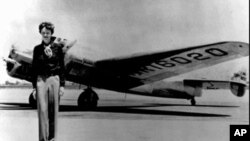U.S. Secretary of State Hillary Clinton has celebrated the life and legacy of aviation pioneer Amelia Earhart, highlighting new efforts to solve the decades-old mystery of what happened to the famed American pilot.
Earhart and her navigator Fred Noonan were last heard from over the Pacific Ocean in 1937 while trying to circumnavigate the globe. They left the Territory of New Guinea, now Papua New Guinea, for Howland Island in the South Pacific, but never arrived. Historians have theorized they may have crashed into the ocean or landed on a reef and survived there for a while.
A new analysis of a photograph taken months after the disappearance shows what some think could be part of the plane, prompting a new search effort by a private group, The International Group for Historic Aircraft Recovery. The search will take place off the Kiribati islands.
At a State Department event celebrating Earhart and U.S.-Pacific ties, Clinton recalled how she was interested in the stories of all kinds of women when she was a young girl, and dreamed of becoming the first female astronaut.
She said her hopes were dashed after NASA, which has had many women travel into space since the 1980s, told her it would not have any female astronauts. Clinton said she knew there were women who would live up to their God-given potential and lead the way for others if given the chance.
"And in part," Clinton said, "that was because there was this woman Amelia Earhart, who, when it was really hard, decided she was going to break all kinds of limits - social limits, gravity limits, distance limits. NASA may have said I couldn't go into space, but nobody was there to tell Amelia Earhart she couldn't do what she chose to do. Now it has been 75 years since she set out in that twin-engine Lockheed Electra to be the first pilot - man or woman - to fly around the world along the longest equatorial route. Her legacy resonates today for anyone, girls and boys, who dreams of the stars."
Clinton described Earhart as an "unlikely heroine" for a nation still in the grips of the Great Depression, but that she "embodied the spirit of an America coming of age and increasingly confident, ready to lead in a quite uncertain and dangerous world."
"She gave people hope and she inspired them to dream bigger and bolder," Clinton said. "When she took off on that historic journey, she carried the aspirations of our entire country with her."
The secretary of state also welcomed Tessie Lambourne, the foreign secretary of Kiribati, to the event in Washington.
News
Clinton Celebrates Pioneer Aviatrix Amelia Earhart




